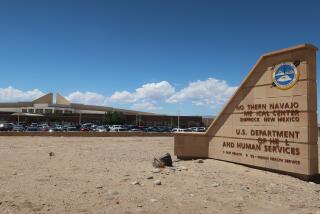MEDICINE / HEART SURGERY : Whites More Likely Than Blacks to Undergo Bypass
- Share via
Older whites are 3 1/2 times more likely than older blacks to receive potentially lifesaving surgery to bypass a blocked coronary artery, according to a new study that offers striking evidence of a wide racial gap in access to medical care.
The study, based on more than 86,000 coronary artery bypass graft surgeries performed under the Medicare program, found that the gap was widest in Southeastern states, where whites were more than six times as likely to have the operation as blacks. It also found that the procedure was five times more prevalent among white men than among black men.
“It is possible that some patients are dying of heart attacks that could have been prevented with surgery,” said Dr. Arthur J. Hartz, a co-author. Others, he said, may be unable to live normal lives when their condition could have been avoided.
The authors of the study, published today in the Journal of the American Medical Assn., said the racial disparity might be traceable to several factors, including black poverty, black reluctance to undergo surgery and physicians’ racial prejudice.
Since the study covered patients who already have insurance under Medicare, a form of national health insurance for people over 65, the findings suggest that social and cultural factors could interfere with access to care even if a broader national health insurance plan is put into place, the authors said.
They and others called for efforts to educate lower-income and minority patients about the benefits of procedures such as bypass surgery, and to point out to physicians factors in the health care system that might lead to racial inequities.
“We need to increase the awareness of the health care community of this problem,” said Dr. Charles L. Curry, chief of cardiology at Howard University School of Medicine in Washington. “That in itself will help a great deal to alleviate this problem.”
The study, led by researchers at the Medical College of Wisconsin in Milwaukee, is not the first to show a racial gap in medical care. Others have shown that access to kidney transplantation, cardiac catheterization and other high-tech procedures, including bypass surgeries, are affected by race.
But the Wisconsin group’s study is the most comprehensive so far, covering the entire country as well as individual regions. It is also the first to look at patterns of use under Medicare, a federal program for which nearly all elderly Americans are eligible.
Using 1986 Medicare program data, the researchers used records of hospitalizations for heart attacks to estimate the prevalence of heart disease by race. They used records of bypass graft operations to estimate rates of the surgery among blacks and whites.
While there appeared to be little difference in heart disease rates between blacks and whites, the rate of coronary artery bypass graft surgery was 27.1 per 10,000 for whites and only 7.6 per 10,000 for blacks.
The rates were 40.4 for white men, 16.2 for white women, 7.6 for black men and 6.4 for black women.
The ratio of white to black rates was greatest for the Southern states east of the Mississippi River, especially in Alabama. In those states, the rate for whites was higher than the national average for whites, and the rate for blacks was lower than the average.
The study did not attempt to pinpoint the cause of the racial gap. But the authors and others in the field said the the pattern probably results from a combination of factors. Kenneth C. Goldberg, the paper’s lead author, said the greater poverty of blacks could keep some from major surgery. While Medicare covers much of a person’s treatment, patients still must pay a deductible and a percentage of their hospital bill.
Curry, the Howard University cardiologist, said physicians may fail to accurately diagnose coronary artery disease in blacks, both because many were taught that blacks do not get the disease and because blacks may describe their symptoms differently.
Curry also said some blacks may be more suspicious of the medical Establishment than whites because of perceived mistreatment. They may also be more inclined to put off medical treatment because they are unaware that it is needed or hope that the condition will clear up.
Dr. Jay Brown, chief of cardiology at Harlem Hospital and president of the Assn. of Black Cardiologists, said blacks may have greater difficulty getting to a specialist--perhaps because they have inadequate primary care or less strong relationships with primary-care doctors.
But Brown also suggested that the racial disparity in coronary artery bypass graft surgeries may be partially explained by an overuse of the pricey, and potentially lucrative, procedure in whites with good health insurance.
As for the possibility of racial prejudice on the part of doctors, co-author Hartz said it is “probably not overt (but rather) subtle and to a large extent unconscious.” He and Goldberg declined to speculate further on the precise effects of such a bias.






